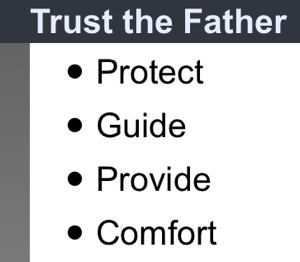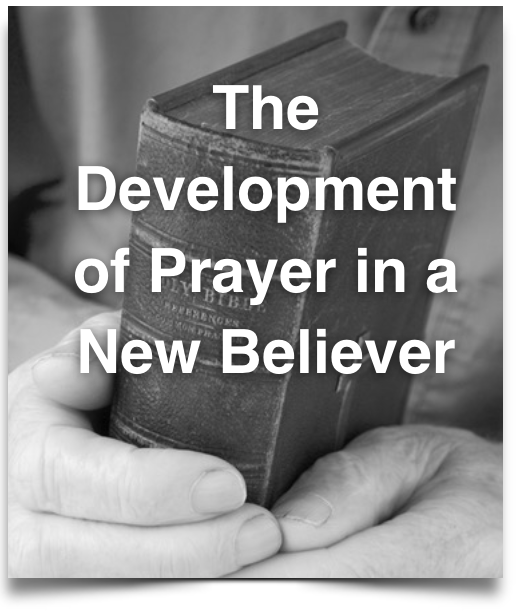
The Development of Prayer in a Believer’s Life
– Through the Perspective of the Flow –
Paul J. Bucknell
_________________________
Development of Prayer | New Believer Stage | Young Believer Stage | Mature Believer Stage
Nature of our prayer Life | Chinese podcast (中文)
Purpose:The Developing Prayer Life of the New Believer analyzes how prayer develops at the most basic level of his or her Christian life when a person becomes a believer and begins to pray to God the Father. The important foundation for a good prayer life are set up early in a believer's life. A spiritual evaluation is available at the end.
_________________________
 The Developing Prayer Life of the New Believer
The Developing Prayer Life of the New Believer
"The little child"
Just as we see numerous growing processes take place in a newborn, so we see similar spiritual growth processes take place in a new believer’s life. If the baby does not grow or show signs of growth, such as a healthy appetite, everyone becomes gravely concerned. So it is with a new believer.
The child learns early on that he (or she) is being cared by some people who care for him (called parents). He totally depends on them and their care for him.
It is in this relationship that the child develops trust. He learns that he can trust his parents and that his parents to care for his needs.
There will be things that will challenge the little one’s understanding of his parents. Perhaps one day he will venture near a hot oven and almost touch it. Suddenly his mom goes hysteric and grabs his hand.

The child will not understand all the implications of what had happened but because the parent still feeds him and cares for him, the child learns to adjust his life’s routine (doesn’t touch the stove anymore). It is not a big deal. Only later in life will the child really understand his mom’s action (if he remembers). Right now it is a matter of trust in his Mom’s actions.
A new believer like a little child’s growth starts from a new birth. He can and should grow very quickly. From experience we know what will generally happen once a baby is born.
I have eight children and can verify that the birth process and early growth patterns have, despite the uniqueness of each child, the same development path. It is only because of this my wife and I have written two books on parenting. We share these principles so that parents can be ahead of us in their parenting when they start.
Prayer takes an integral place in a new believer's life. The whole foundation of this new believer’s relationship with God is started at the new birth when one is born again and like breathing should continue on.
Once the Spirit of God comes in, there is a network through which the believer can relate to God through Jesus Christ.
“For who among men knows the thoughts of a man except the spirit of the man, which is in him? Even so the thoughts of God no one knows except the Spirit of God. Now we have received, not the spirit of the world, but the Spirit who is from God, that we might know the things freely given to us by God” (1 Corinthians 2:11-12).
The new believer receives the Holy Spirit at his new birth and becomes the means he communicates with the Lord back and forth. From 1 John 2:12-14 we find a number of important aspects of the new believer’s life.
“I am writing to you, little children, because your sins are forgiven you for His name’s sake.... I have written to you, children, because you know the Father.” (1 John 2:12-13).
Here is a list of items that should occur at this basic level.
Affirm one's faith
The new believer begins to talk to God because He is his Father. Every word spoken to God is an affirmation of his faith. The new believer might not even be aware of this process, but it is still real, genuine and awesome. A meager new believer is speaking to the Almighty God and He is hearing!
It is natural for a new believer to talk to God. God made us to talk with Him. There is no doubt that the language will develop and the relationship deepen just as a child learns to speak.
In one sense we do not need to instruct the new believer to pray as he or she will talk (pray) to God. But just in case they are confused or feel unworthy, we should clarify what prayer is and how they are to relate to their heavenly Father through Jesus.
They are told how they now have a Father in heaven who wants to hear from them and speak to them. This relationship is based on faith because one most often cannot use our senses to verify this relationship. It depends on faith but is still very real.
One of the biggest challenges is to help the new believer realize that God wants to hear them pray. Just think of a father. How often does he engage in conversation with his little children. I hope it is often! We need to set a good model.
Personal evalution:
Did your own father want to hear from you? If not, you might find it to be a special challenge to think that God even wants to hear your prayer! You might know it theologically but difficult to really believe it and carry it out. Just think the difference it would make if you really believed He was eagerly waiting for you to come to Him each day.
These things greatly affect your motivation level.
Confess sins
The new believer will also learn how to seek forgiveness for his wrongs. This is basically a follow-up teaching upon the repentance which thrusted him into new life. He learns that his Father in heaven has certain expectations from him. He needs to obey. If he fails in pleasing Him, he must from a humble heart (not mere ritual) acknowledge his sin, claim Christ’s forgiveness and maintain a good relationship with his Heavenly Father.
Problem: If the believer is not careful, when his sins he might wrongly believe that God has rejected him, doesn’t want him or lost his chance at being a believer. This is not true. If we have sinned, God wants us to come to Him through Jesus (1 John 2:1-2). (Note: The time from our fall to our humble confession and again seek God’s face often denotes our immaturity or maturity in our relationship with God. The shorter, the more mature.)
There is another problem that often develops here. Depending on how a person perceives God and his own sin, he might not set a good foundation for his future prayer life. It is critical that the new believer really understand the heinous character of sin. If he treats his sin as something which can easily be passed over, he is setting up a rough road ahead. The success of a believer's growth is built on a health relationship with God which is found in living a truly humble life under God’s abounding grace.
Test: How hard is it for you to confess your sin? One person in a country I recently visited said, “Men do not say sorry.” How might this affect his marriage and relationship with God?
Seek God’s will
The new believer will soon discover that he does not live for his own will. As God’s child, he is to seek God’s will for his life. He does this through reading God’s Word and praying. He has to learn step by step that God means the best for him and all his children. In other words, God’s will is to be sought after and obeyed rather than avoided and disobeyed.
A large part of understanding God’s will is found through our quiet times of prayer and reflection on God’s Word (what God speaks to us).

Problem: The believer who has never come to trust God’s will as best is leery of finding out what God wants for his life. This approach to the Christian life will cause great aberrations in the believer’s life especially in the area of fear and temptations of worldly living.
Often a level of mistrust lurks between God who cares for us and we who trust Him occurs. This doubt will be misused by the evil one to stir up our disobedience. This in turn will have its own consequences (whether we understand it as such or not).
If one mistrusts God’s will, then he in fact doubts God’s love and care for him. Without this level of security and trust, he will be a very anxious person. He has not learned to trust the Lord for his own life.
Personal evalution:
Do you question whether God’s will for your life is always best for you? Where so?
Thank the Father
The new believer needs to know how to respond to the display of God’s kindness. We might feel funny as parents teaching our children to say, “Thank you.” But there is nothing more natural and right! Once learned, a believer can learn to regularly thank the Lord for His care for him.
“In everything give thanks; for this is God’s will for you in Christ Jesus” (1 Thessalonians 5:18).
Those who have not broken from a fearful approach to God have a hard time coming to the Lord in a bright faith of thanking Him. They are stuck thinking like Eve. They are blinded by the evil’s one’s tainted words suggesting that they are missing out on the best even when He has provided so many wonderful things.
Personal evalution:
Have you developed a growing admiration of the Father’s care for you so that you regularly heartily give thanks to Him?
Trust Father (Protect, guide, provide, comfort)
Trust in one’s Heavenly Father is the key element at this stage. Trust in the Lord brings peace, joy and contentment. However, if trust is not present, then the relationship cannot grow. Trust is essential to a developing relationship.

If a new believer does not learn to trust God’s care for his life, then he will doubt His protection, guidance, provision and comfort. He will think of himself more as an orphan even though he is the Mighty One’s child.
Many believers have never really gotten far beyond this point. They have a great difficulty believing that God really cares for them. They probably were not loved in their own homes and now project their father’s coldness upon God. We need to strip this shadow from the Lord and only obey Him. He can be fully trusted.
Personal evalution:
What are the most difficult areas for you to trust the Lord? What are the easiest?
Recently when speaking with my daughter about college and fees, she asked whether it is strange not to worry about the finances. I delighted in the question as it indicated a strong faith in the Lord. She has learned from the many challenges that we go through that God does provide for what He desires for our lives.
Spiritual Evaluation #1
When a new relationship is begun between God our Father and our lives, the first things that we experience leave great impressions upon our lives. Satan wants to twist our response and thus get us to mistrust the Lord of our lives.
Did you find yourself valued and treasured growing up? How much do you feel that the Lord really wants to hear you?
How much did your father talk to you when growing up? Were you allowed to speak back? Did you share about your life or just the ‘most’ important things that your father thought about?
On a level of 1 through 6, circle the most appropriate answer for your trust level in the Lord.
- I know the Lord really loves to hear me talk to Him.
(not really) 3-4 (some) 6 (very much so)
- I share many private things with the Lord.
1 (not really) 3-4 (some) 6 (very much so)
- I might not understand why but I can trust Him with what comes my way.
1 (not really) 3-4 (some) 6 (very much so)
- I feel joy in my heart when I give thanks to my Father for what He provides.
1 (not really) 3-4 (some) 6 (very much so)
- I am open for anything God asks of me.
1 (not really) 3-4 (some) 6 (very much so)
We recommend that you discuss these questions with others or reflect in your own personal journal. These concepts reveal areas of past growth and place the Lord will be training you.
=> Next the Developing Prayer life of the Young Believer










